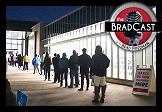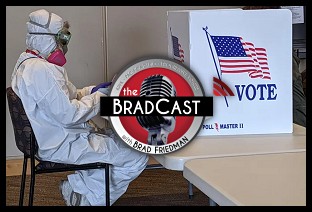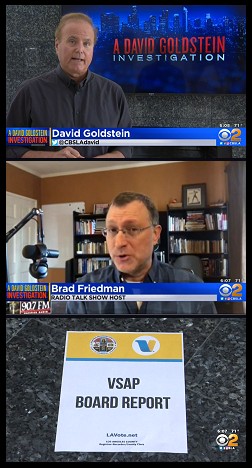 On today's BradCast: Last year, a federal judge in Georgia banned the state's 20-year old, unverifiable touchscreen voting systems, finding them to be "unsecure, unreliable and grossly outdated" and, thus, effectively unconstitutional for use in federal elections. This week, that same federal judge held a hearing to determine whether the new unverifiable touchscreen voting systems Georgia has chosen to use this year for the first time are any better, or whether the Peach State should have listened to the cybersecurity and voting systems experts who strongly urged the state to move, instead, to a verifiable hand-marked paper ballot system. [Audio link to show follows below.]
On today's BradCast: Last year, a federal judge in Georgia banned the state's 20-year old, unverifiable touchscreen voting systems, finding them to be "unsecure, unreliable and grossly outdated" and, thus, effectively unconstitutional for use in federal elections. This week, that same federal judge held a hearing to determine whether the new unverifiable touchscreen voting systems Georgia has chosen to use this year for the first time are any better, or whether the Peach State should have listened to the cybersecurity and voting systems experts who strongly urged the state to move, instead, to a verifiable hand-marked paper ballot system. [Audio link to show follows below.]
But first today, Hurricane Sally slammed ashore near the Alabama / Florida border this morning. As predicted, the very slow moving storm is packing a punch, with rainfall "measured in feet, not inches swamping homes and forcing the rescue of hundreds of people as it pushed inland." Desi Doyen joins us for the latest on that slow moving disaster as water is quickly rising, rescues continue, the storm moves into Georgia, and as more hurricanes are already lining up behind it in an already record breaking Atlantic hurricane season (which still continues until late November!)
Even as that climate change-intensified disaster unfolds on the heels of Hurricane Laura just three weeks ago (with thousands still without power and in shelters in Louisiana), along with the record deadly climate-fueled wildfires out west, Donald Trump has chosen --- amid all of this --- a notorious climate science denier for a top position on "environmental observation and prediction" at the National Oceanic and Atmospheric Administration (NOAA).
If those stories don't underscore the existential importance of this year's elections, we don't know what would.
On that score, the final state Primary Elections of the 2020 season were held on Tuesday in Joe Biden's adopted home state of Delaware, with most ballots cast by mail, and with both masks and social distancing in place at the polls. Happily, there have been no reported voting problems to come to my attention yet and, as expected, there were few surprises in the reported computer-tallied results. Some of them, however, are either eyebrow raising, historic, or just plain fun. Among those categories is the QAnon conspiracist who is now the Republican nominee for the U.S. Senate in the state; the first openly transgender person to (almost certainly) win a seat in a state Senate; and the 12-year, Democratic state legislator who opposed same-sex marriage being beaten soundly on Tuesday --- in a landslide --- by a local, gay, progressive drag queen!
And with the primaries finally (and thankfully!) out of the way, we move straight to the general elections and back to Georgia, which Democrats hope to flip from red to blue in the Presidential election this year for the first time in decades. But it's also a state where not one, but two vulnerable Republican U.S. Senators are facing tough re-election challenges from Democrats.
There is a lot riding politically on the state of Georgia this year, which makes this week's much-anticipated three-day virtual hearing in an Atlanta federal court all the more critical. When the second day of the three-day hearing which wrapped up this week, regarding the security of the state's vulnerable new computer voting, pollbook and tabulation systems was interrupted --- "Zoom bombed" --- with photos of the 9/11 attacks, swastikas and pornography posted by a user calling him or herself "Osama", it would have been impossible for U.S. District Court Judge Amy Totenberg to miss the irony.
"It was a very sobering reminder of just how vulnerable electronics are, and just how targeted the United States and our elections are right now," says MARILYN MARKS, our guest today. She is Executive Director of the non-partisan Coalition for Good Governance, a lead plaintiff in the long-running case. She says it served as a reminder of the need to "get hand-marked paper ballots that are verifiable and auditable."
The Coalition is suing for a ruling that would find Georgia's new, unverifiable, $100+ million touchscreen voting system made by the Canadian firm Dominion Voting Systems to be an unconstitutional burden on the right to vote. That would be a similar finding to the one Totenberg issued last year, effectively banning and decertifying the state's 20-year use of its previous insecure, unverifiable touchscreen voting systems made by Diebold.
In addition to hoping to see those systems replaced with verifiable hand-marked paper ballots, the Coalition is asking the judge to order backup paper pollbooks at every polling place, after the new electronic pollbook systems failed during the state's June primary elections, leading to hours-long lines, largely in minority voting districts. The plaintiffs are also calling for oversight of the state's optical-scan tabulation systems which failed to tally thousands of votes on absentee ballots during the state's recent primaries. (We interviewed Jeanne DuFort, who discovered that problem, and is also a plaintiff in this case on several recent programs.)
Marks shares her observations from this week's hearings, including on the testimony and cross-examination of the Coalition's cybersecurity and voting systems expert witnesses (many of whom have also appeared multiple times on this show, including Univ. of Michigan's Alex Halderman, UC-Berkley's Philip Stark, expert data researcher Kevin Skoglund and legendary Finnish cybersecurity expert Harri Hursti). Similarly, Marks offers her thoughts on the state's, um, less-than-expert witnesses and responds to a number of allegations made by the attorney representing Georgia and its Republican Sec. of State Brad Raffensperger, who selected this new, "Rube Goldberg" computerized voting system despite the urging of experts and voters alike.
Among the stunning points noted by Marks was the testimony from the man who led the certification testing of this system for the U.S. Election Assistance Commission (EAC). Marks reports the witness seemed "quite confused about the technology" and "admitted to having no real security background and not really any long-term established security people on his team." She says his testimony "made it clear that security is really not a top priority for the certification of voting systems" at the federal level, adding, "It was really kind of unbelievable."
While transcripts may be available from the hearing soon (we'll update with a link to them here when they are), Marks noted some portions will be redacted, since the state argued privately in front of the judge on certain issues that even the plaintiffs were not allowed to witness. (Though I wonder whether "Osama" did?)
"The public learned a lot from these expert witnesses about just how seriously vulnerable the Georgia election system is," she tells me. "The expert witnesses gave extremely compelling testimony during the direct examination by our attorneys. But when the state's attorneys got them up on the stand for cross-examination, they were equally strong. Quite frankly, the state was really not able to get in any type of evidence --- because there is none --- that would help get anyone comfortable with their equipment."
When it came to the witnesses from the state and the voting system vendors, she says, her attorneys explained to the court that those "experts have not been able to tell the court just the basic fundamental operational and security details --- the plaintiffs have been the ones who bring all the information. The state basically had no one with any independence. Every expert witness they had had a financial interest in ballot-marking devices. Two of the expert witnesses are [voting system] vendors, three of the expert witnesses are vendors of ballot-marking device suppliers. So they were hardly considered independent, at least by the laymen who were watching."
While Marks says she does not know when Totenberg will issue her ruling, it is likely to be soon. Reports from the virtual courtroom via AP suggest Judge Totenberg appeared concerned by points made by the plaintiffs and may be forced to implement changes --- if she determines there is time to do so with Early Voting beginning in just four weeks in the Peach State. Marks believes there is plenty of time to make the state's elections more secure and overseeable, though the state begs to differ. Soon we'll learn how the Judge feels.
During closing arguments, according to AP's coverage, Robert McGuire, an attorney for the Coalition and individual voter plaintiffs, "recalled Totenberg's prior admonitions to the state" by noting that "Totenberg previously told the state that a new voting system should address the need for 'transparent, fair, accurate, and verifiable election processes that guarantee each citizen's fundamental right to cast an accountable vote.'" But the state's new computerized Ballot Marking Device system "satisfies none of these requirements," McGuire said...
(Snail mail support to "Brad Friedman, 7095 Hollywood Blvd., #594 Los Angeles, CA 90028" always welcome too!)
|


 Not All Bad: Abortion Rights Won Big (Almost) Everywhere: 'BradCast' 11/7/24
Not All Bad: Abortion Rights Won Big (Almost) Everywhere: 'BradCast' 11/7/24 'Green News Report' 11/7/24
'Green News Report' 11/7/24
 U.S. GIVES SECOND TERM TO CONVICTED CRIMINAL, ADJUDICATED RAPIST: 'BradCast' 11/6/24
U.S. GIVES SECOND TERM TO CONVICTED CRIMINAL, ADJUDICATED RAPIST: 'BradCast' 11/6/24 ELECTION DAY 2024: Tea Leaves, Probs for Some Voters, Details on What's Next: 'BradCast' 11/5/24
ELECTION DAY 2024: Tea Leaves, Probs for Some Voters, Details on What's Next: 'BradCast' 11/5/24 'Green News Report' 11/5/24
'Green News Report' 11/5/24 'Closing Arguments' for Undecideds, Third-Party Voters: 'BradCast' 11/4/24
'Closing Arguments' for Undecideds, Third-Party Voters: 'BradCast' 11/4/24 Sunday 'Your Choice' Toons
Sunday 'Your Choice' Toons The GOP 'Voter Fraud'
The GOP 'Voter Fraud' 'Green News Report' 10/31/24
'Green News Report' 10/31/24 'Closing Arguments'with Digby and Driftglass: 'BradCast' 10/30/24
'Closing Arguments'with Digby and Driftglass: 'BradCast' 10/30/24 Trump Promises to be a Lawless, Authoritarian President. Believe Him: 'BradCast' 10/29/24
Trump Promises to be a Lawless, Authoritarian President. Believe Him: 'BradCast' 10/29/24 'Green News Report' 10/29/24
'Green News Report' 10/29/24 Ballots Burn, Billionaires 'Obey in Advance', Callers Ring In: 'BradCast' 10/28/24
Ballots Burn, Billionaires 'Obey in Advance', Callers Ring In: 'BradCast' 10/28/24 Musk's Privatized Internet Satellite System Threatens U.S. National Security
Musk's Privatized Internet Satellite System Threatens U.S. National Security Sunday 'VOTE NOW!' Toons
Sunday 'VOTE NOW!' Toons 'Green News Report' 10/24/24
'Green News Report' 10/24/24 Harris on Hope, Trump's Fasc-ism in Bumpy Closing Days: 'BradCast' 10/24/24
Harris on Hope, Trump's Fasc-ism in Bumpy Closing Days: 'BradCast' 10/24/24 Kelly: Trump 'Fascist', Admires Hitler, Disrespects Law: 'BradCast' 10/23/24
Kelly: Trump 'Fascist', Admires Hitler, Disrespects Law: 'BradCast' 10/23/24 Accountability Comes For Rudy, Other Election Deniers: 'BradCast' 10/22/24
Accountability Comes For Rudy, Other Election Deniers: 'BradCast' 10/22/24 Elon Musk's 'Vote Buying' and Lying for Trump: 'BradCast' 10/21/24
Elon Musk's 'Vote Buying' and Lying for Trump: 'BradCast' 10/21/24 Fake v. Real Censorship and Trump/Fox Fetish-ized Grievance World: 'BradCast' 10/17/24
Fake v. Real Censorship and Trump/Fox Fetish-ized Grievance World: 'BradCast' 10/17/24 'Americans Aren't Prepared for Trump's Police State': 'BradCast' 10/16/24
'Americans Aren't Prepared for Trump's Police State': 'BradCast' 10/16/24 Good News for Georgia Voters, the Economy and Kamala Harris: 'BradCast' 10/15/24
Good News for Georgia Voters, the Economy and Kamala Harris: 'BradCast' 10/15/24 Fascism Comes to America: 'BradCast' 10/14/24
Fascism Comes to America: 'BradCast' 10/14/24
 VA GOP VOTER REG FRAUDSTER OFF HOOK
VA GOP VOTER REG FRAUDSTER OFF HOOK Criminal GOP Voter Registration Fraud Probe Expanding in VA
Criminal GOP Voter Registration Fraud Probe Expanding in VA DOJ PROBE SOUGHT AFTER VA ARREST
DOJ PROBE SOUGHT AFTER VA ARREST Arrest in VA: GOP Voter Reg Scandal Widens
Arrest in VA: GOP Voter Reg Scandal Widens ALL TOGETHER: ROVE, SPROUL, KOCHS, RNC
ALL TOGETHER: ROVE, SPROUL, KOCHS, RNC LATimes: RNC's 'Fired' Sproul Working for Repubs in 'as Many as 30 States'
LATimes: RNC's 'Fired' Sproul Working for Repubs in 'as Many as 30 States' 'Fired' Sproul Group 'Cloned', Still Working for Republicans in At Least 10 States
'Fired' Sproul Group 'Cloned', Still Working for Republicans in At Least 10 States FINALLY: FOX ON GOP REG FRAUD SCANDAL
FINALLY: FOX ON GOP REG FRAUD SCANDAL COLORADO FOLLOWS FLORIDA WITH GOP CRIMINAL INVESTIGATION
COLORADO FOLLOWS FLORIDA WITH GOP CRIMINAL INVESTIGATION CRIMINAL PROBE LAUNCHED INTO GOP VOTER REGISTRATION FRAUD SCANDAL IN FL
CRIMINAL PROBE LAUNCHED INTO GOP VOTER REGISTRATION FRAUD SCANDAL IN FL Brad Breaks PA Photo ID & GOP Registration Fraud Scandal News on Hartmann TV
Brad Breaks PA Photo ID & GOP Registration Fraud Scandal News on Hartmann TV  CAUGHT ON TAPE: COORDINATED NATIONWIDE GOP VOTER REG SCAM
CAUGHT ON TAPE: COORDINATED NATIONWIDE GOP VOTER REG SCAM CRIMINAL ELECTION FRAUD COMPLAINT FILED AGAINST GOP 'FRAUD' FIRM
CRIMINAL ELECTION FRAUD COMPLAINT FILED AGAINST GOP 'FRAUD' FIRM RICK SCOTT GETS ROLLED IN GOP REGISTRATION FRAUD SCANDAL
RICK SCOTT GETS ROLLED IN GOP REGISTRATION FRAUD SCANDAL VIDEO: Brad Breaks GOP Reg Fraud Scandal on Hartmann TV
VIDEO: Brad Breaks GOP Reg Fraud Scandal on Hartmann TV RNC FIRES NATIONAL VOTER REGISTRATION FIRM FOR FRAUD
RNC FIRES NATIONAL VOTER REGISTRATION FIRM FOR FRAUD EXCLUSIVE: Intvw w/ FL Official Who First Discovered GOP Reg Fraud
EXCLUSIVE: Intvw w/ FL Official Who First Discovered GOP Reg Fraud GOP REGISTRATION FRAUD FOUND IN FL
GOP REGISTRATION FRAUD FOUND IN FL



















 Today's
Today's  On today's
On today's  On today's
On today's  On today's
On today's  On today's
On today's  On March 3rd's Super Tuesday primary elections, Los Angeles County's new, $300 million, 100% unverifiable touchscreen Ballot Marking Device (BMD) voting systems and electronic pollbooks failed catastrophically. The disaster resulted in hours-long lines to vote at new Voting Centers in the nation's most populous voting jurisdiction leaving untold thousands unable to cast a vote at all.
On March 3rd's Super Tuesday primary elections, Los Angeles County's new, $300 million, 100% unverifiable touchscreen Ballot Marking Device (BMD) voting systems and electronic pollbooks failed catastrophically. The disaster resulted in hours-long lines to vote at new Voting Centers in the nation's most populous voting jurisdiction leaving untold thousands unable to cast a vote at all. On today's
On today's  On today's
On today's  On today's
On today's  I might have headlined this show "See? I told ya so!", except Rush Limbaugh
I might have headlined this show "See? I told ya so!", except Rush Limbaugh  On today's
On today's  We've got a whole lot jammed into one single hour of
We've got a whole lot jammed into one single hour of  On today's
On today's  On today's
On today's 













